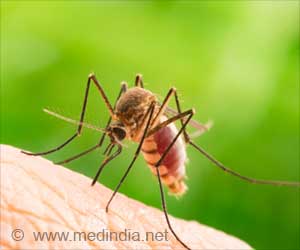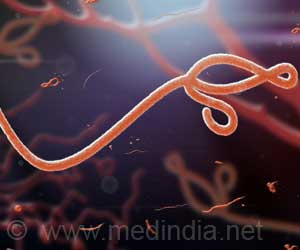The mosquitoes that transmit malaria can actually help scientists find potential new ways to fight this disease, a new study has revealed.
The mosquitoes that transmit malaria can actually help scientists find potential new ways to fight this disease, a new study has revealed.
Researchers at the European Molecular Biology Laboratory (EMBL) in Heidelberg, Germany, and the Institut National de la Sante et de la Recherche Medicale (INSERM) in Strasbourg, France, have found that variations in a single gene affect mosquitoes' ability to resist infection by the malaria parasite."Malaria parasites must spend part of their lives inside mosquitoes and another part inside humans, so by learning how mosquitoes resist malaria, we may find new tools for controlling its transmission to humans in endemic areas," says Stephanie Blandin from INSERM, who carried out the research at EMBL in collaboration with Lars Steinmetz's group and with Rui Wang-Sattler, presently at the Helmholtz Zentrum in Munich, Germany.
The scientists looked for clues in the genome of Anopheles gambiae mosquitoes, a major carrier of the parasite that causes the most severe form of human malaria in Africa.
They focused on the mosquitoes' resistance to a commonly used model organism: Plasmodium berghei, a parasite that causes malaria in rodents.
Comparing the genomes of mosquitoes that could resist this infection with those of mosquitoes that could not, the researchers found that the major difference was in a single section of one chromosome.
Of the roughly 975 genes contained in that section of DNA, one in particular appeared to play an important role in determining a mosquito's resistance to malaria.
With an eye on determining whether that difference in alleles caused the variation in the mosquitoes' resistance to malaria, the researchers developed a novel technique, reciprocal allele-specific RNA interference, inspired by one Steinmetz's group had previously created to study yeast.
The technique helped the scientists identify exactly which allele was behind a specific trait.
They produced individual mosquitoes that had one TEP1 allele from the resistant strain and another from a susceptible strain, and then "turned off" - or silenced - one or other of these alleles.
According to the researchers, silencing different alleles produced mosquitoes with different degrees of resistance to malaria, which means that an individual mosquito's resistance to the malaria parasite depends largely on which form(s) of the gene it carries.
The study might have focused on the parasite that causes malaria in rodents, the researchers insist that there is evidence that this gene may also be involved in the mosquitoes' immune response to human malaria.
They are currently exploring this connection, hoping that their efforts might one day help make malaria eradication programs more effective.
The study has been published in the journal Science.
Source-ANI
RAS
 MEDINDIA
MEDINDIA




 Email
Email




